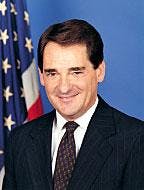Congressional leaders late last month officially began talks designed to reconcile differences between the House and Senate energy bills with both sides calling for a spirit of compromise. Negotiators spent the first day of the conference making televised opening remarks; more-serious discussions are expected after a week-long break for the July 4th holiday.
Lawmakers were hopeful that a final bill could be prepared for President George W. Bush's signature before Congress adjourns this fall. "I hope and expect that the bipartisanship that prevailed during House consideration of this legislation will continue in the conference," said House Energy and Commerce Committee Chairman Billy Tauzin (R-La.), who is also chairman of the House-Senate conference committee on the energy bill."I ask all my colleagues to remember the diversity of valuable reforms and initiatives represented in this legislation. It is too important to be used for political ends. Energy legislation has traditionally transcended party lines and, for the first major bill of its kind in the 21st Century, I expect no less."
Pending proposals
The House bill contains a provision that allows leasing in the 1002 area of the Arctic National Wildlife Refuge in Alaska, a plan not in the Senate document. Both bills have large energy tax provisions, although the $33 billion House version is about twice the size of the Senate bill. The Senate plan also contains pipeline safety legislation, tax incentives and loan guarantees for a new Alaska gas pipeline, and an ethanol fuel standard not present in the House bill. There is broad bipartisan support in the Senate for both the Alaska gas line and the ethanol fuel provisions.
Tauzin's counterpart in the Senate, Jeff Bingaman (D-NM), chairman of the Senate Energy and Natural Resources Committee, declared he is "optimistic" that differences could be worked out despite a tight legislative schedule. But that assumes members stay on task and avoid protracted ideological battles, he noted.
"I think this conference has an excellent opportunity to develop a balanced and comprehensive proposal that can pass both Houses and go to the president's desk," Bingaman said. "We will need to be realistic, though. Our conference report won't, of necessity, have every idea that each particular conferee thinks is important. While there are many areas of agreement between the House and the Senate, we all know there are some major areas of disagreement. And we don't have unlimited time to work," Bingaman said.
Political will
Energy lobbyists say it is no sure thing that there is the political will to deliver a bill both Democrats and Republicans can be satisfied with in an election year. But publically at least, key leaders from both parties profess a desire to get the job done.
When the Senate passed its version of the bill in late April, for example, Republican Policy Committee Chairman Larry Craig (R-Ida.) said he thought Congress wants to send a bill to the White House. And acknowledging that some ideas still on the table may be deal-breakers, he predicted that ANWR would not survive a House-Senate conference, given the strong opposition the measure ran into in the Senate. He also expected the final bill would contain energy tax incentives greater than those in the Senate proposal but less than in the House legislation. Another important proposal expected to survive negotiations is a Senate plan to triple ethanol fuel use in gasoline.
Proponents of the ethanol proposal, which include an unusual coalition of oil, farm, and environmental interests plus Northeast state administrators affirmed this month that they expect a final bill to include the Senate provision with a minimum of changes.
Meanwhile, Sec. of Energy Spencer Abraham confirmed that President Bush supports the ethanol provision, despite administration reservations that the proposal may make gasoline more expensive on the East and West coasts.
Even though the House bill does not currently have an ethanol provision, Tauzin recently signaled he supports the ethanol provision along with the related proposals to phase out methyl tertiary butyl ether and offer up to $1 billion in grants to help refiners switch from ethers to other octane components.
ANWR
On ANWR, however, there is considerably less consensus. Senate Democratic leaders have warned that any bill that contains a leasing provision will compromise further talks and prevent a bill from reaching the White House. President Bush supports opening up a piece of ANWR to exploration but has not said he would veto a bill that does not contain such a provision. But some lawmakers from energy-producing states aren't willing to give up on the issue just yet.
House Resources Committee Chairman James Hansen (R-Utah) said he wants to see ANWR be part of the final bill.
"We put ANWR on the table and won it in the House last year because domestic oil production was critical to our nation's prosperity and national security. In the wake of Sept. 11, the stakes have only become higher. Making the United States self-reliant in the production of her own energy was important before Sept. 11. Now, it's absolutely vital. It will remain vitally important for the foreseeable future," said Hansen. "I'm going into the conference committed to sustaining America's energy self-reliance, strong national security, and ongoing contribution to a clean global environment through domestic energy production."
And perhaps the Senate's most visible ANWR supporter, Sen. Frank Murkowski (R-Alas.) called on his colleagues to keep an open mind about the issue.
"Now, more than ever, there is so much more riding on the success of this conference," he said. "There are many contentious issues in these bills: CAFE (Corporate Average Fuel Economy), renewable portfolio, climate change, ANWR, pipeline safety, efficiencies, and other issues. It would be a travesty if we took the position, as some have, that the Senate is going to oppose any provision that is not contained in the Senate bill. We all must be open to negotiation because that is the role we play-to craft legislation drawing elements from both bills," he said.



